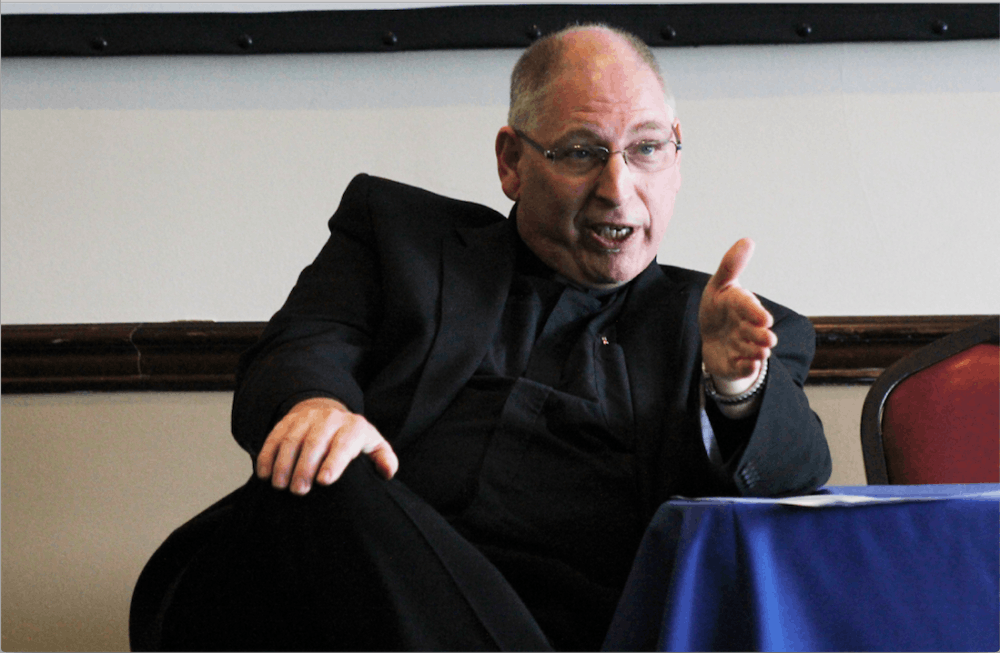Fr. Timothy Graff recalled a desperate plea from an immigrant Ecuadorian couple, Simon and Ligia, who had not seen their two teenage children in five years. Simon, a glassworker, immigrated to the U.S. with his wife due to a lack of employment in his home country. The children had to be left behind.

They asked Graff to visit their children on a trip he was taking to Ecuador. The five years that kept the family apart culminated into one message Simon had entrusted with Graff to deliver to his children: “Tell them they don’t understand why we are here, but every sacrifice we make is for them.”
When Graff arrived at their home in Ecuador and delivered the father’s message, their 13-year-old girl burst into tears. In that moment, Graff began to understand the pain of immigration.
Graff was invited to give a lecture on April 10 titled, “A Stranger and You Took Me In: The Local Catholic Community and Immigration” where he talked about this experience with Simon and Ligia, how the church helps immigrant families and his work with communities to embrace the catholic principles of immigration.
“Using that biblical image [of taking in a stranger] in terms of immigration is treating others with respect and dignity, even if we don’t know them,” he said. “Even if they’re strangers to us, there is still a relationship because of our common faith.”
In his work as a priest and director of the Human Concerns Office for the Archdiocese of Newark, he has seen initiatives such as “Know your rights’”workshops, arming undocumented immigrants with knowledge to resist arrest by Immigration and Customs Enforcement (ICE), as well as offering ESL and citizenship classes.
“I think its acceptance but also accepting them as equals, as people worthy of respect, worthy of dignity,” he said. “We have to get to know them, hear their stories and their voice.”
Those who are arrested are taken to detention centers in New Jersey, where local police pay for-profit companies to house detainees. These contracts incentivize detention centers, like one in Elizabeth, N.J., to run at full capacity.
A guest at the event, Sr. Regina Holtz serves as the office manager for First Friends of New Jersey and New York, one of the organizations helping approximately 2,200 immigrants held in the four facilities in North New Jersey.
First Friends has offered services such as visitations. Holtz, who has been with First Friends for a decade, says that immigrants never leave the buildings meaning there is no fresh air or windows to look out.
Holtz expressed that the burden of truth is placed on these individuals to prove they deserve to stay in the country. Many are sent back. Only two percent receive asylum. Yet, Holtz said that the visitation program is a great way to support the detainees.
“We are there to live up to our name, to be a friend to that person,” Holtz said. “The first time I went, we visited a Nigerian man I’ve never met before. This man burst into tears because I was the first person that had come to see him.”
It is an uphill battle for many detainees given that of their documents are often back in their countries and access to a lawyer is not always feasible. Legal representation alone is the biggest concern according to Graff, with $2.1 million for universal representation set aside in N.J. Gov. Phil Murphy’s state budget.
At the conclusion of the lecture, the attendees expressed their willingness to get SHUinvolved with some form of collaboration in to offer aid to immigrants.
The Dean of the School of Diplomacy and International Relations, Dr. Andrea Bartoli, was one voice calling for the possibility of the University offering its resources, such as the School of Law, to immigrants on campus and in New Jersey.
“Many of us within the University, because we are Catholic and care for social justice, see this as the right time to really call this community to a different level of response,” Bartoli said.
There was no confirmation from any administrator whether they would follow up with this proposition, but Graff was adamant that any conversation had to involve Seton Hall students.
“Undocumented students need to be part of the conversation if Seton Hall is going to offer any help,” Graff said. “We need to hear their stories and put a face on the statistic.”
Nicholas Mariano can be reached at nicholas.mariano@student.shu.edu.





